2000年高考英语(全国卷)试题,答案和录音文本
- 格式:docx
- 大小:21.60 KB
- 文档页数:6
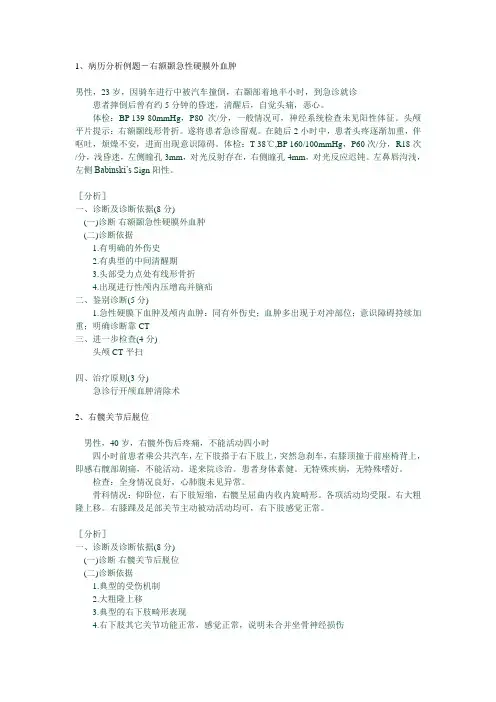
1、病历分析例题-右额颞急性硬膜外血肿男性,23岁,因骑车进行中被汽车撞倒,右颞部着地半小时,到急诊就诊患者摔倒后曾有约5分钟的昏迷,清醒后,自觉头痛,恶心。
体检:BP 139-80mmHg,P80次/分,一般情况可,神经系统检查未见阳性体征。
头颅平片提示:右额颞线形骨折。
遂将患者急诊留观。
在随后2小时中,患者头疼逐渐加重,伴呕吐,烦燥不安,进而出现意识障碍。
体检:T 38℃,BP 160/100mmHg,P60次/分,R18次/分,浅昏迷,左侧瞳孔3mm,对光反射存在,右侧瞳孔4mm,对光反应迟钝。
左鼻唇沟浅,左侧Babinski’s Sign阳性。
[分析]一、诊断及诊断依据(8分)(一)诊断右额颞急性硬膜外血肿(二)诊断依据1.有明确的外伤史2.有典型的中间清醒期3.头部受力点处有线形骨折4.出现进行性颅内压增高并脑疝二、鉴别诊断(5分)1.急性硬膜下血肿及颅内血肿:同有外伤史;血肿多出现于对冲部位;意识障碍持续加重;明确诊断靠CT三、进一步检查(4分)头颅CT平扫四、治疗原则(3分)急诊行开颅血肿清除术2、右髋关节后脱位男性,40岁,右髋外伤后疼痛,不能活动四小时四小时前患者乘公共汽车,左下肢搭于右下肢上,突然急刹车,右膝顶撞于前座椅背上,即感右髋部剧痛,不能活动。
遂来院诊治。
患者身体素健。
无特殊疾病,无特殊嗜好。
检查:全身情况良好,心肺腹未见异常。
骨科情况:仰卧位,右下肢短缩,右髋呈屈曲内收内旋畸形。
各项活动均受限。
右大粗隆上移。
右膝踝及足部关节主动被动活动均可,右下肢感觉正常。
[分析]一、诊断及诊断依据(8分)(一)诊断右髋关节后脱位(二)诊断依据1.典型的受伤机制2.大粗隆上移3.典型的右下肢畸形表现4.右下肢其它关节功能正常,感觉正常,说明未合并坐骨神经损伤二、鉴别诊断(5分)1.股骨颈骨折和转子间骨折(骨折机制走路滑倒时,身体扭转倒地所致患肢短缩,患髋呈屈曲内收外旋畸形)三、进一步检查(4分)右髋正侧位X线片可证实脱位,并了解脱位情况及有无合并骨折四、治疗原则(3分)1.无骨折或只有小片骨折的单纯性后脱位,应手法复位,皮索引固定2.如髋臼后缘有大块骨折或粉碎骨折或股骨头骨折,属复杂性后脱位,目前主张早期手术治疗,切开腹位与内固定3、右肱骨髁上骨折女性,6岁。
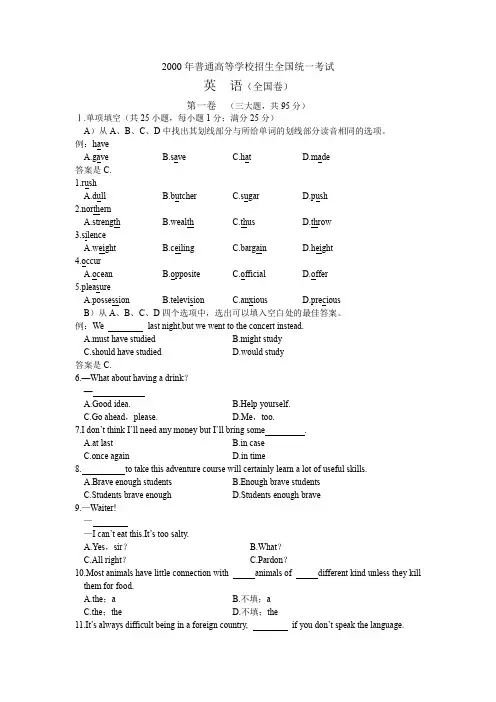
2000年普通高等学校招生全国统一考试英语(全国卷)第一卷(三大题,共95分)Ⅰ.单项填空(共25小题,每小题1分;满分25分)A)从A、B、C、D中找出其划线部分与所给单词的划线部分读音相同的选项。
例:haveA.gaveB.saveC.hatD.made答案是C.1.rushA.dullB.butcherC.sugarD.push2.northernA.strengthB.wealthC.thusD.throw3.silenceA.weightB.ceilingC.bargainD.height4.occurA.oceanB.oppositeC.officialD.offer5.pleasureA.possessionB.televisionC.anxiousD.preciousB)从A、B、C、D四个选项中,选出可以填入空白处的最佳答案。
例:We last night,but we went to the concert instead.A.must have studiedB.might studyC.should have studiedD.would study答案是C.6.—What about having a drink?—A.Good idea.B.Help yourself.C.Go ahead,please.D.Me,too.7.I don’t think I’ll need any money but I’ll bring some .A.at lastB.in caseC.once againD.in time8. to take this adventure course will certainly learn a lot of useful skills.A.Brave enough studentsB.Enough brave studentsC.Students brave enoughD.Students enough brave9.—Waiter!——I can’t eat this.It’s too salty.A.Yes,sir?B.What?C.All right? C.Pardon?10.Most animals have little connection with animals of different kind unless they kill them for food.A.the;aB.不填;aC.the;theD.不填;the11.It’s always difficult being in a foreign country, if you don’t speak the language.A.extremelyB.naturallyC.basicallyD.especially12.Let Harry play with your toys as well,Clare-you must learn to .A.supportB.careC.spareD.share13.—you’ve left the light on.—Oh,so I have. and turn it off.A.I’ll goB.I’ve goneC.I goD.I’m going14.Someone called me up in the middle of the night,but they hung up I could answer the phone.A.asB.sinceC.untilD.before15.—Are you coming to Jeff’s party?—I’m not sure.I go to the concert instead.A.mustB.wouldC.shouldD.might16.If you want to change for a double room you’ll have to pay $15.A.anotherB.otherC.moreD.each17.Dorothy was always speaking highly of her role in the play, , of course,made the others unhappy.A.whoB.whichC.thisD.what18. production up by 60%,the company has had another excellent year.A.AsB.ForC.WithD.Through19.I’ve worked with children before,so I know what in my new job.A.expectedB.to expectC.to be expectingD.expects20.—How are you today?—Oh,I as ill as I do now for a very long time.A.didn’t feelB.wasn’t feelingC.don’t feelD.haven’t felt21.The WTO cannot live up to its name it does not include a country that is home to one fifth of mankind.A.as long asB.whileC.ifD.even though22.The managers discussed the plan that they would like to see the next year.A.carry outB.carrying outC.carried outD.to carry out23.—Why don’t we take a little break?—Didn’t we just have ?A.itB.thatC.oneD.this24.It is the ability to do the job matters not where you come from or what you are.A.oneB.thatC.whatD.it25.The reporter said that the UFO east to west when he saw it.A.was travellingB.travelledC.had been travellingD.was to travelⅡ.完形填空(共25小题,每小题1分;满分25分)阅读下面短文,掌握其大意,然后从26~50各题所给的四个选项中,选出一个最佳答案。
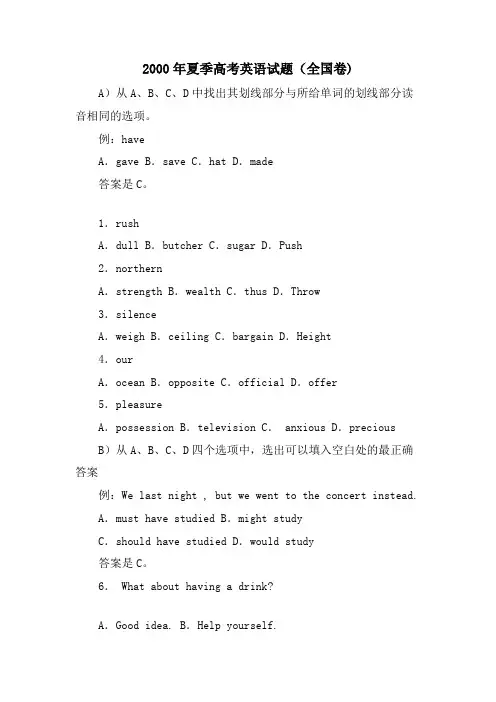
2000年夏季高考英语试题(全国卷)A)从A、B、C、D中找出其划线部分与所给单词的划线部分读音相同的选项。
例:haveA.gave B.save C.hat D.made答案是C。
1.rushA.dull B.butcher C.sugar D.Push2.northernA.strength B.wealth C.thus D.Throw3.silenceA.weigh B.ceiling C.bargain D.Height4.ourA.ocean B.opposite C.official D.offer5.pleasureA.possession B.television C. anxious D.preciousB)从A、B、C、D四个选项中,选出可以填入空白处的最正确答案例:We last night , but we went to the concert instead.A.must have studied B.might studyC.should have studied D.would study答案是C。
6. What about having a drink?A.Good idea. B.Help yourself.C.Go ahead , please D.Me , too.7.I don't think I'll need any money but I'll bring some .A.at last B. in caseC.once again D.in time8.to take this adventure course will certainly learn a lot of useful skills.A.Brave enough students B.Enough brave studentsC.Students brave enough D.Students enough brave9. Waiter!I can't eat this , It's too salty.A.Yes, sir? B.What?C.All right? D.Pardon?10.Most animals little connection with animals of different kind unless they kill them for food.A.the ; a B.不填 ; aC.the ; the D.不填 ; the11.It's always difficult being in a foreign country, if you don't speak the language.A.extremely B.naturallyC.basically D.especially12.Let Harry play with your toys as well , Clare you must learn to。
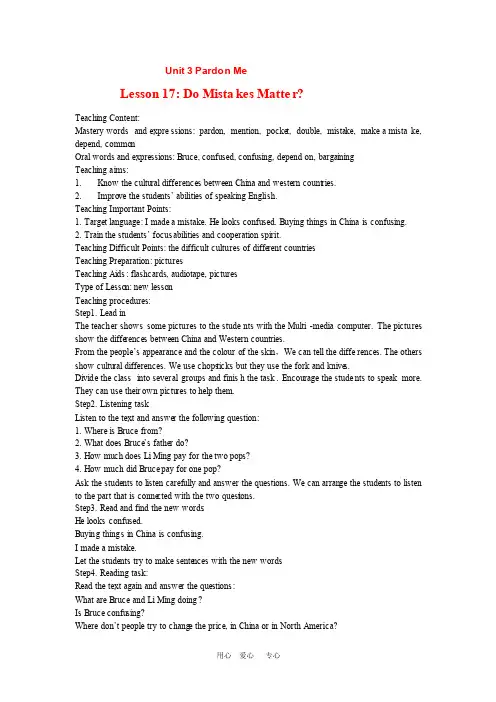
Unit 3 Pardon MeLesson 17: Do Mistak es Matter?Teachi ng Conten t:Master y wordsand expres sions: pardon, mentio n, pocket, double, mistak e, make a mistak e, depend, commonOral wordsand expres sions: Bruce, confus ed, confus ing, depend on, bargai ningTeachi ng aims:1. Know the cultur al differ ences betwee n Chinaand wester n countr ies.2. Improv e the studen ts’abilit ies of speaki ng Englis h.Teachi ng Import ant Points:1. Target langua ge: I made a mistak e. He looksconfus ed. Buying things in Chinais confus ing.2. Trainthe studen ts’focusabilit ies and cooper ation spirit.Teachi ng Diffic ult Points: the diffic ult cultur es of differ ent countr iesTeachi ng Prepar ation: pictur esTeachi ng Aids: flashc ards, audiot ape, pictur esType of Lesson: new lessonTeachi ng proced ures:Step1. Lead inThe teache r showssome pictur es to the studen ts with the Multi-mediacomput er. The pictur es show the differ ences betwee n Chinaand Wester n countr ies.From the people’sappear anceand the colour of the skin,We can tell the differ ences. The others show cultur al differ ences. We use chopst icksbut they use the fork and knives.Divide the classinto severa l groups and finish the task. Encour age the studen ts to speakmore. They can use theirown pictur es to help them.Step2. Listen ing taskListen to the text and answer the follow ing questi on:1. Whereis Brucefrom?2. What does Bruce’sfather do?3. How much does Li Ming pay for the two pops?4. How much did Brucepay for one pop?Ask the studen ts to listen carefu lly and answer the questions. We can arrang e the studen ts to listen to the part that is connec ted with the two questi ons.Step3. Read and find the new words:He looksconfus ed.Buying things in Chinais confus ing.I made a mistak e.Let the studen ts try to make senten ces with the new words.Step4. Readin g task:Read the text againand answer the questi ons:What are Bruceand Li Ming doing?Is Bruceconfus ing?Wheredon’tpeople try to change the price, in Chinaor in NorthAmeric a?Encour age the studen ts to ask more questi ons by themse lves.Step5. Fill in the blanks with the rightformsof the wordsgiven.1.My brothe r is _______(迷惑的).2.It is so ______(迷惑的) a thing.3.Does he often______(犯错误)?This part is used to checkif they have graspe d the new words.Step6.Activi tySuppos e you and Bruceare shoppi ng, you are bargai ningwith the clerk. Brucecan bargai n, too. Divide the classinto severa l groups and talksaboutthe questi ons. Aftera while, let the studen ts act theirout in frontof the class.Encour age the studen ts to speakloudly in frontof the class.Choose the best groupand praise them.Step7. Thinkabout:What’sthediffer encebetwee n people in Chinaand NorthAmeric a when they are shoppi ng?Use the formal groupto finish the task. When the studen ts discus s, the teache r walksaround the classr oom to see if they need any help.Step8. Talk about: Wherewouldyou like to buy things, in shoppi ng center or market?Let them debate the questi ons. As usual,the classcan be divide d into two groups. One groupthinks the shoppi ng center is good. The otherthinks the market is better. Let them debate for five minute s. Then let one studen t in each groupto sum the opinio ns of his own group.Step9. Homewo rkFind more inform ation aboutthe differ ences betwee n Chinaand wester n countr ies.Summar y:This intere sting text is aboutbargai ningin China.It’sbasedon the differ ent cultur es betwee n Chines e and Wester n countr ies. In some countr ies in NorthAmeric a, peopledon’ttrytobargai n, so some foreig n friend s feel confus ed when they buy things in China. Try to help them when you meet foreig ners.Try to find more differ ences betwee n Chines e and Wester n countr ies on the Intern et.Lesson18:Wait!Don’tEatYet!Teachi ng Conten t:Master y wordsand expres sions: societ y, polite ly, manner, especi ally,unless, polite, fork, serve, foreve r, act, compar e, theirsOral wordsand expres sions: custom, tablec loth, rude, toothp ick, Spaghe tti, sauceTeachi ng Aims:1. Find the differ ences betwee n the Chines e and Wester n custom s at table.2. Cultiv ate the studen ts’creati on and cooper ation spirit.Teachi ng Import ant Points:1. The expres sions of simila ritie s and differ ences.2. Graspthe Past Future Tense.Teachi ng Diffic ult Points:The expres sions of simila ritie s and differ ences.Teachi ng Prepar ation: pictur esTeachi ng Aids: flashc ards, audiot ape, pictur esType of Lesson: new lessonTeachi ng Proced ures:Step1. Lead in: a pair work.The teache r asks the studen ts the follow ing questi on: Have you ever travel ed to otherplaces? Wherehave you been?Show some pictur es with the help of the multi-media. The pictur es are from Austra lia, France, China, Englan d, Americ a and Japan.Let the studen ts discus s for 2 or 3 minute s. Then let them say in frontof the class.When the studen t is speaki ng, the others can ask him or her questi ons abouthis subjec t.Step2. Listen ing taskListen and answer the follow ing questi ons:1. Tablemanner s in Chinaand Canada are quite______.2. In China, if your guests have no food on theirplates, puttin g food on theirplates is ______.3. It’s______ to use a toothp ick at the table.Finish the task in classin oral.Step3. Read the text and find out the senten ces with the new words. All societ ies have custom s abouthow to eat polite ly.We call thesecustom s“tablemanner s”.It’sokaytoeatit, especi allyifit’ssometh ing dry, like a pieceof bread.In Canada, if you drop someth ing on the tablec loth, you pick it up and put it on your plate.Parent s are foreve r tellin g theirchildr en:“Don’ttalkwithyourmothfull!”Step4. Readin g task:Read the text and decide the statem entsare true or false.1. In China, if you drop someth ing on the tablec loth, you usuall y pick it up and eat it.2. In Canada, to finish the food in frontof the classin rude.In China, everyb ody has a knifeat the table. Exerci ses: Fill in the blanks with the rightformsof the wordsgiven.1. I think______(sing) loudly at tableis not polite.2. It’srude______ (point) to the others when you eat at table.3. His mother said he ______ (return) the fork to the restau ranttomorr ow.4. Nobody ______(know) the secret except me.Step6.Activi ty:Projec t: What’sthestory?1. Find pictur es in magazi nes.2. Make up a quickstoryaboutyour pictur e.3. Tradeyour pictur e with the studen ts from anothe r group. Practi ce:Show some pictur es to the studen ts. Let the studen ts pictur e them. Show some differ ent pictur es in differ ent situat ions. Let them give vividdescri ption. When they finish one pictur e, try to show them the wholestory.Ifwedon’thaveenough time, show them the main idea.Step8.Consol idati onSuppos e you have a foreig n friend. He will come to China.Make a chart.Writedown his/her name, his nation ality, his langua ge and his aims. Show it to your partne r, then finish it in class.Lesson 19:Saying sTeachi ng Conten t:Master y wordsand expres sions: cultur e, severa l, action, fly, as soon asOral wordsand expres sions: saying, penny,earn, boil, hatch,judge,preven tion,cure, worm, fence, spoil, broth, honey, vinega r, Nick, giggleTeachi ng Aims:1. Know more aboutthe differ ences betwee n the Chines e and Wester n tablemanner s.2. Trainthe studen ts focusabilit ies.3. Cultiv ate the studen ts’cooper ation abilit ies.Teachi ng Import ant Points:1. Unders tandi ng the Englis h saying.2. The expres sions of simila ritie s and differ ences.3. The past future tense.Teachi ng Diffic ult Points:Learnthe expres sions of simila ritie s and differ ences betwee n Chines e and Wester n countr ies on tablemanner s and saying s.Teachi ng Prepar ation: pictur esTeachi ng Aids: flashc ards, audiot ape, pictur esType of Lesson: new lessonTeachi ng Proced ures:Step1.Lead in:The teache r begins the classby discus singthe questi on. It is a groupactivi ty. Ask the studen ts to tell the manner s at the table.In the activi ty, the studen ts will thinkof many funnystorie s. Give them chance to speakin frontof the class. Praise the groups that act well.Step2. Listen ing task:Listen and answer the follow ing questi ons:1. Who does Nick sit beside?2. Is Nick full at last?Listen ing is necess ary for traini ng the studen ts listen ing abilit ies. Rememb er to give them a few easy questi ons to answer.Step3. Readin g task:Read and find the new words:But as soon as his bowl was empty, the grandm other put more in it.WuYang’slittle sister giggle d.Let the studen ts make senten ces with the new words.S1: The studen ts stop talkin g as soon as the teache r comesin.S2: My mother came in as soon as I watche d TV.S3: WhileI am speaki ng, Wang Yan giggle s all the time.Step4. Read and find the diffic ult langua ge points:1. Nick ate it all up.2. The grandm other kept giving him more.3. Wu Yang was trying not to smile.Let the studen ts try usingthe phrase s in Englis h.S5: I’msohungry that I eat up all the food on the table.S6: He was not good at Englis h, but he kept trying his best. We all admire him.S7: Try to pass the exam, please.Step5.Divide the classinto severa l groups in threeor four. Guessthe meanin gs of the Englis h saying s.Firstlet them exchan ge the meanin gs of the saying s in the groupfirst.Then exchan ge the meanin gs in groups.Let the studen ts decide whichare the correc t answer s to the Englis h saying s.Step6. Exerci ses:1.I will call you __________(一……就)I come back.2.You must _________(解释) it to your parent s.3.Althou gh he failed, he kept _________(努力).4.What _______(其他的) can I do for you?If the teache r wantsto know if they have graspe d the langua ge points of this lesson, he can give them some exerci ses to see the result.Step7. Projec t:It is a groupactivi ty. Divide the classinto severa l groups to finish the task.The people in the story have a proble m.Theydon’tu nders tandeach othervery well.Writean ending for the story.Explai n why you choose you ending. Search more inform ation aboutthe differ ences betwee n Chinaand wester n countr ies at the table.Lesson 20: WhereI Come FromTeaching Conten t:Master y wordsand expres sions: greeti ngOral wordsand expres sions: forgiv eTeachi ng Aims:1. Know more aboutthe cultur al differ ences amongdiffer ent countr ies.2. Cultiv ate the studen ts’cooper ation spirit.Teachi ng Import ant Points:1. The differ ent greeti ng ways in differ ent countr y.2. The Past Future Tense.Teachi ng Diffic ult Points:The simila ritie s and differ ences.Teachi ng Prepar ation: pictur esTeachi ng Aids: flashc ards, audiot ape, picturesType of lesson: new lessonTeachi ng Proced ure:Step1. Lead in by discus singin groups. Finish the task with the help of the flashc ards.Divide the classinto groups of threeor four. Let each groupdiscus s the follow ing questi ons with the help of the pictur es.He /she will come to your home for dinner next Sunday.What will you prepar e for him/her? Try to finish the task in five minute s.Step2. Listen to the tape and let the studen ts sing afterit for severa l times.Step3. Show a globeto the foreig n studen ts. Let’sseewherewe are. Ask some studen ts come tothe frontand pointup wherewe are on the globe.A game. Ask two studen ts to the front.Let’swhocanfindmoreplaces in limite d time. The one who findsmore is the winner.Step4. Read the text as a poem and find the new words. Then make senten ces with in greeti ng, forgiv eWhereI come from we shakehandsin greeti ngandask,“Howareyou?”During a meetin g and forgiv e a mistak e or two.Step5. Groupwork.Ask the studen ts to say some specia l custom s of the foreig n countr ies. For exampl e, the school s are differ ent in Chinaand othercountr ies.Divide the classinto groups of threeor four to finish the task.Step6. Activi tyWork in groups. Thinkaboutyour cultur e. List some specia l Chines e custom s that aren't foundin othercultur es.Step7. Homewo rk1. Finish off the exerci ses in activi ty book.2. Go on the next readin g in the studen t book.Summar y:Englis h songssometi mes are the same as the Chines e songs. They also descri be a subjec t and the conten t is all aboutit. Becaus e of the Englis h songs,the studen ts know more aboutthe foreig n custom s and cultur e.Lesson21:What’sinaName?Teachi ng Conten t:Master y wordsand expres sions: givenname, family name, sirOral wordsand expres sions: formalTeachi ng Aims:1. Know more aboutthe foreig n cultur e.2. Cultiv ate the studen ts’learni ng abilit ies.Teachi ng Import ant Points:1. The struct ure of Englis h names.2. The differ ences betwee n Englis h and Chines e names.Teachi ng Diffic ult Points:The struct ure of Englis h names.Teachi ng Prepar ation: pictur esTeachi ng Aids: flashc ards, audiot ape, pictur esType of lesson: new lessonTeachi ng Proced ure:Step1. Lead in by discus sing: How much do you know aboutthe differ ences betwee n Chines e and Wester n names?Work in groups. Then one of the member s of the groups givesa report to the class.Step2. Listen to the tape and fill in the blanks with the inform ation you hear.1. In Wester n countr ies, people have ______names.2. _______ isLiMing’sfirstname. Finish the task in classin oral.Step3. Read and find the new wordsin the text.1. My givennamesare“Brian”and“James”.2. My familynameis“Smith”.3. That’formal in Englis h.Practi ce the new wordsin class.Stp4. The langua ge points:I’malittle confus ed.But in Chinait comeslast!What do they say when they meet on a formal occasi on?Make senten ces with the langua ge points.Step5. Practi ce:Tell us why Dannyis confus ed. If you understand, give us an exampl e.Let some studen ts say give some exampl es to show the differ ences betwee n Chines e and Englis h names.Step6. Work with a partne r. Writea dialog ue in whichBrianand Wang Mei meet and introd uce themse lves. What do they say when they meet on a formal occasi on.Step7. Homewo rkGive Englis h namesto each of your family member s.Summar y:Englis h namesare so differ ent from Chines e namesthat some Chines e studen ts are confus ed aboutthem. Let the studen ts choose Englis h namesthemse lves. Then they c an choose Englis h namesfor theirfamily member s. I believ e practi ce makesperfec t.Lesson 22: Do Manner s Matter?Teachi ng Conten t:Master y wordsand expres sions: praiseOral wordsand expres sions: JoeTeachi ng Aims:1. Know more aboutthe foreig n cultur e.2. Cultiv ate the studen ts’abilit ies aboutlearni ng Englis h.Teachi ng Import ant Points:1. Good manner s in Chinaand NorthAmeric a.2. Apolog ies, simila ritie s and differ ences.3. Past Future Tense.Teachi ng Diffic ult Tense:Past Future Tense.Teachi ng Prepar ation: pictur esTeachi ng Aids: flashc ards, audiot ape, pictur esType of lesson: new lessonTeachi ng Proced ure:Step1. Lead in by a groupwork.Ask the studen ts to tell the differ ences aboutthe manner s when you receiv e the presen ts.Work in groups of threeor four. Everyo ne writes his or her answer s down on a pieceof paper. Then exchan ge theirideas. Next sum the main ideasand presen t them to the class.Step2. Listen to the tape and fill in the blanks with the correc t words.1. Wu Zhou has livedin Canada for ______ years.2. Good manner s in NorthAmeric a are ______ from good manner s in China.3. When people give you giftsin Canada, you ______ them with many words.Finish the task in classin oral.Step3. Read the text an d decide the follow ing statem entsare true or false.1. In NorthAmeric a, thereare no wordsfor beingpolite.2. When people give you giftsin Canada, you mightsay,“Idon’twantyourgift.”3. Wu Zhou is a teache r in a univer sityin Canada.Finish the task in classin oral.Step4. Read the text again. Tell the main idea of the text and encour age the studen ts to ask more questi ons aboutthe text. They can ask questi ons like these:S1: Wu Zhou callshimsel f Joe Wu, why?S2: Becaus e“Joe”isanEnglis h name that soundslike“Zhou”.S3: Ifyoudon’tsay“please”or“thankyou”, what will people thinkof you?S4: They will thinkyou are rude.Step5. ActWork with your partne r. Suppos e you receiv e a presen t from your friend s, what will you say if you are Chines e and what will you say if you are Canadi an?Act your dialog ue out in frontof the class. Let the studen ts get the differ ences by theiracting. Step6.Cometo“LET’SDOIT”Before we do this, the teache r can show the studen ts more aboutthe differ ences betwee n Chines e and Canadi an cultur e on the Internet.Divide the classinto groups of threeor four to finish the task. Everyo ne writehis or her ideasdown then exchan ge the ideasin the group. Make up a dialog ue or give a report. Then presen t it in frontof the class.Step7. Homewo rk1. Finish the exerci ses in the activi ty book.2. Go on the next readin g in the studen t book.Summar y:The cultur e differ ences show in differ ent ways. Let the studen ts thinkof more situat ionsandlet’sfind out how to do on the Intern et. Teachthe studen ts how to learnis more import ant than what to learn. So give the studen ts more time to practi ce in class.Lesson 23: Supper with the Bradsh awsTeachi ng Conten t:Master y wordsand expres sions: troubl eOral wordsand expres sions: pepper mint, tradit ionTeachi ng Aims:1. Know aboutthe simila ritie s and differ ences betwee n Chinaand Wester n countr ies.2. Cultiv ate the studen ts’abilit ies.Teachi ng Import ant Points:1. Apolog ies.2. Simila ritie s and differ ences.3. Past Future Tense.Teachi ng Diffic ult Points:Past Future TenseTeachi ng Prepar ation: pictur esTeachi ng Aids: flashc ards, audiot ape, pictur esType of lesson: new lessonTeachi ng Proced ure:Step1. Lead in by discus singwhat you will do when your friend s say goodby e to you.Divide the classinto groups of threeor four. Everyo ne writes theirideasdown then exchan ge them in groups. Sum the ideas then give a report in frontof the class.Step2. Listen to the tape and answer the follow ing questi ons:1. We just came home from the ______.2. Bruceand his father had troubl e with Chines e ______ and cultur e.3. Last night, we eat in the ______.Finish the task in classin oral.Step3. Scan the text and answer1. Did Bruceand his father make mistak es in China?2. Wester n people nevereatduck’sfeet,dothey?3. Does Li Ming like pepper mints?Finish the task in classin oral.Step4. Read the text again. Find the senten ces with the new words.But he and his father someti mes had troubl e with Chines e custom s and cultur e.At the end of the meal, Mr. Bradsh aw opened a box of pepper mintcandie s.In good Chines e tradit ion, I told him that I enjoye d it.Show some pictur es to help the studen ts rememb er the new words.Step5. Act it out.Divide the classinto severa l groups. Ask each groupto act one part of the text out. Before doingthis, let them read the text fluent ly and decide whichpart to act it out.Iftheydon’thaverealpepper mints or someth ing they must use, they can use someth ing else to replac e them.Step6. Come to “LET’SDOIT”.Divide the classinto groups. Ask them to discus s what makesthem embarr assed when they are guests at a dinner. Everyo ne writes his ideasdown. Then exchan ge them in groups. At last, one of the groups sums the group’sideasand presen ts it in frontof the class.They can writea diaryentry, an e-mail or a letter aboutthe dinner.Step7. Homewo rk1. Finish off the exerci ses in the activi ty book.2. Go on the next readin g in the studen t book.Summar y:It is not easy to make friend s with foreig ners.It is helpfu l to know more aboutthe differ ences betwee n Chines e and wester n custom s and cultur e. Acting the text out is intere sting. The teache r can ask the studen ts to bringsometh ing useful into the class.Iftheydon’thaverealones, they can use someth ing to replac e it.Lesson 24: Unit ReviewTeachi ng Conten t:Master y wordsand expres sions from Lesson17 to Lesson23.Oral wordsand expres sions from Lesson17 to Lesson23.Teachi ng Aims:1. Know aboutthe differ ences betwee n Chines e and wester n custom s and cultur e.2. Cultiv ate the studen ts’learni ng abilit ies and cooper ation spirit.Teachi ng Import ant Points:1. Apolog ies.2. Simila ritie s and differ ences.3. The past future tense.Teachi ng Diffic ult Points:The past future tense.Teachi ng Prepar ation: pictur esTeachi ng Aids: flashc ards, audiot ape, pictur esTeachi ng Proced ure:Step1. Show some pictur es aboutdiffer ent tablemanner s to the studen ts. Encour age the studen ts to act out a dialog ue to show the differ ences. Give them five minute s. Let the studen ts act in frontof the class.Step2. Ask the studen ts to talk aboutthe differ ent custom s and cultur e betwee n Chinaand wester n countr ies. Show some pictur es to remind the studen ts. They can show them in all kindsof styles. They can make a dialog ue or writea passag e.Step3. Finish the exerci ses in classin oral. Writesome proble ms down on the blackb oard. Discus s in the class. Then choose the correc t answer.Step4.Cometo“Gramma rinUse”.Let the studen ts make more senten ces with the past future tense.It is oftenused in the object clause, when the subjec t is past tense,the object clause is oftenused the past future tense. Encour age them to give more exampl es to practi ce it.Step5.Cometo“Speaki ng the Langua ge”.Ask volunt eersto act the dialog ue out in frontof the class. Encour age the studen ts to make otherdialog ues and act them out.Step6.Cometo“Writte nwork”.Let the studen ts writeit as homewo rkifwecan’tfinish it in class.It’spracti ce of the main ideasof this unit. It can also buildthe studen ts’vocabu lary.Step7. Homewo rk1. Finish off the exerci ses in activi ty book.2. Go on the next readin g in the studen t book.Summar y:The studen ts practi ce theirreadin g, speaki ng and writte n Englis h in this text. It is used to buildthe studen ts’vocabu lary.The teache r must make full use of this part. At the same time, encour age them to remind the main ideasof this unit. Give them more time to use what we learnin this unit. S2: My mother came in as soon as I watche d TV.S3: WhileI am speaki ng, Wang Yan giggle s all the time.Step4. Read and find the diffic ult langua ge points:1. Nick ate it all up.2. The grandm other kept giving him more.3. Wu Yang was trying not to smile.Let the studen ts try usingthe phrase s in Englis h.S5: I’msohungry that I eat up all the food on the table.S6: He was not good at Englis h, but he kept trying his best. We all admire him.S7: Try to pass the exam, please.Step5.Divide the classinto severa l groups in threeor four. Guessthe meanin gs of the Englis h saying s.Firstlet them exchan ge the meanin gs of the saying s in the groupfirst.Then exchan ge the meanin gs in groups.Let the studen ts decide whichare the correc t answer s to the Englis h saying s.Step6. Exerci ses:1.I will call you __________(一……就)I come back.2.You must _________(解释) it to your parent s.3.Althou gh he failed, he kept _________(努力).4.What _______(其他的) can I do for you?If the teache r wantsto know if they have graspe d the langua ge points of this lesson, he can give them some exerci ses to see the result.Step7. Projec t:It is a groupactivi ty. Divide the classinto severa l groups to finish the task.The people in the storyhave a proble m. Theydon’tunders tandeach othervery well.Writean ending for the story.Explai n why you choose you ending. Search more inform ation aboutthe differ ences betwee n Chinaand wester n countr ies at the table.用心爱心专心。
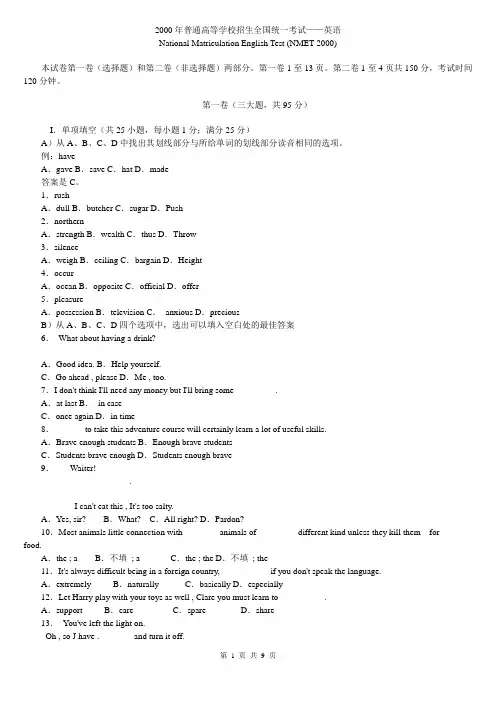
2000年普通高等学校招生全国统一考试——英语National Matriculation English Test (NMET 2000)本试卷第一卷(选择题)和第二卷(非选择题)两部分。
第一卷1至13页。
第二卷1至4页共150分,考试时间120分钟。
第一卷(三大题,共95分)I.单项填空(共25小题,每小题1分;满分25分)A)从A、B、C、D中找出其划线部分与所给单词的划线部分读音相同的选项。
例:haveA.gave B.save C.hat D.made答案是C。
1.rushA.dull B.butcher C.sugar D.Push2.northernA.strength B.wealth C.thus D.Throw3.silenceA.weigh B.ceiling C.bargain D.Height4.occurA.ocean B.opposite C.official D.offer5.pleasureA.possession B.television C.anxious D.preciousB)从A、B、C、D四个选项中,选出可以填入空白处的最佳答案6.What about having a drink?_____________A.Good idea. B.Help yourself.C.Go ahead , please D.Me , too.7.I don't think I'll need any money but I'll bring some _________.A.at last B.in caseC.once again D.in time8._______to take this adventure course will certainly learn a lot of useful skills.A.Brave enough students B.Enough brave studentsC.Students brave enough D.Students enough brave9.----Waiter!---- _____________.----I can't eat this , It's too salty.A.Yes, sir? B.What?C.All right? D.Pardon?10.Most animals little connection with ________animals of _________different kind unless they kill them for food.A.the ; a B.不填; a C.the ; the D.不填; the11.It's always difficult being in a foreign country, ___________if you don't speak the language.A.extremely B.naturally C.basically D.especially12.Let Harry play with your toys as well , Clare you must learn to __________.A.support B.care C.spare D.share13.You've left the light on.Oh , so J have .________and turn it off.A.I'll go B.I've gone C.I go D.I'm going14.Someone called me up in the middle the night , but they hung up __________I could answer the phone.A.as B.since C.until D.before15.Are you coming to Jeff's party?I'm not sure . I ________go to the concert instead.A.must B.would C.should D.might16.If you want to change for a double room you'll have to pay_______$15.A.another B.other C.more D.Each17.Dorothy was always speaking highly of her role in the play, ________,of course , made the others unhappy.A.who B.which C.this D.what18.______production up by 60% , the company has had another excellent year.A.As B.For C.With D.Through19.I've worked with children before , so I know what ________in my new job.A.expect ed B.to expect C.to be expecting D.expects20.How are you today?Oh , I ___________as ill as I do now for a very long time.A.didn't fell B.wasn't feeling C.don't fell D.haven't felt21.The WTO cannot live up to its name ________it does not include a country that is home to one fifth of mankind.A.as long as B.while C.if D.even though22.The managers discussed the plan that they would like to see _______the next year.A.carry out B.carrying out C.carried out D.to carry out23.Why don't we take a little break?Didn't we just have __________?A.it B.that C.one D.this24.It is the ability to do the job _______matters where you come from or what you are.A.one B.that C.what D.it25.The reporter said that the UFO ________east to west when be saw it.A.was traveling B.travelled C.had been traveling D.was to travel.II完形填空(共25小题,每小题1分;满分25分)I climbed the stairs slowly , carrying a big suitcase , my father following with two more . By the time I got to the thirdfloor , I was 26 and at the same time felling lonely . Worse still , Dad 27 a step and fell , sending my new suitcases 28 down the stairs . "Damn !"he screamed , his face turning red . I knew 29 was ahead . Whenever Dad's face turns red , 30 .How could I ever 31 him to finish unloading the car 32 screaming at me and making a scene in front of the other girls , girls I would have to spend the 33 of the year with? Doors were opening and faces peering out(探出),as Dad walked 34 close behind . I felt it in my bones that my college life was getting off to a(n) 35 start." 36 the room , quickly ,"I thought . "Get him into a chair and calmed down ." But 37 , would there be a chair in Room316? Or would it be a(n) 38 room?39 I turned the key in the lock and 40 the door open , with Dad 41 .complaining(抱怨)about a hurting knee or something .I put my head in , expecting the 42 . But to my 43 , the room wasn't empty . at all ! It had furniture , curtains , a TV , and seven paintings on the walls.And there on a well-made bad sat A my new 44 ,dressed neatly , Greeting me with a nod , she said in a soft voice , "Hi , you must be Cori ." Then , she 45 the music and looked over at 46 ,"And of course , you're Mr . Faber ,"she said 47 ."Would you like a glass of iced tea?" Dad's face turned decidedly 48 before he could bring out a "yes."I knew 49 that Amy and I would be 50 and my first year of college would be a success26.A.helpless B.lazy C.anxious D.tried27.A.took B.minded C.missed D .picked28.A.rolling B.passing C.dropping D.turning29.A.suffering B.difficulty C.trouble D.danger30.A.go ahead B.look out C.hold on D.give up31.A.lead B.help C.encourage D.get32.A.after B.without C.while D.besides33.A.best B.beginning C.end D.rest34.A.with difficulty B.in a hurry C.with firm steps D.in wonder35.A.fresh B.late C.bad D.unfair36.A.Search B.Find C.Enter D.Book37.A.in fact B.by chance C.once more D.then again38.A.small B.empty C.new D.neat39.A.Finally B.Meanwhile C.Sooner or later D.At the moment40.A.knocked B.forced C.pushed D.tried41.A.yet B.only C.even D.still42.A.worst B.chair C.best D.tea43.A.regret B.disappointment C.surprise D.knowledge44.A.roommate B.classmate C.neighbour D.companion45.A.turned on B.turned down C.played D.enjoyed46.A.Dad B.me C.the door D.the floor47.A.questioning B.wondering C.smiling D.guessing48.A.red B.less pale C.less red D.pale49.A.soon B.there C.later D.then50.A.sisters B.friends C.students D.fellowsIII阅读理解(共25小题。
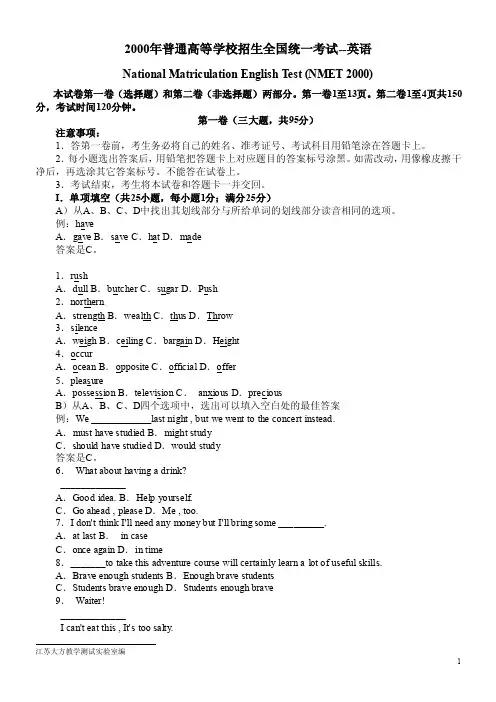
2000年普通高等学校招生全国统一考试--英语Nationa l Matricul ation Engl ish T est (NMET 2000)本试卷第一卷(选择题)和第二卷(非选择题)两部分。
第一卷1至13页。
第二卷1至4页共150分,考试时间120分钟。
第一卷(三大题,共95分)注意事项:1.答第一卷前,考生务必将自己的姓名、准考证号、考试科目用铅笔涂在答题卡上。
2.每小题选出答案后,用铅笔把答题卡上对应题目的答案标号涂黑。
如需改动,用像橡皮擦干净后,再选涂其它答案标号。
不能答在试卷上。
3.考试结束,考生将本试卷和答题卡一并交回。
I.单项填空(共25小题,每小题1分;满分25分)A)从A、B、C、D中找出其划线部分与所给单词的划线部分读音相同的选项。
例:ha veA.gav e B.save C.hat D.mad e答案是C。
1.rus hA.dull B.butcher C.sugar D.Push2.northernA.strengt h B.wealth C.thus D.Throw3.silenceA.weigh B.ceiling C.bargain D.Height4.occurA.ocean B.o pposite C.official D.offer5.pleasureA.posses sion B.tel evision C.anxious D.preciousB)从A、B、C、D四个选项中,选出可以填入空白处的最佳答案例:We____________last nig ht , but w e went tothe concer t instead.A.musthave studi ed B.might studyC.should ha ve studied D.would s tudy答案是C。
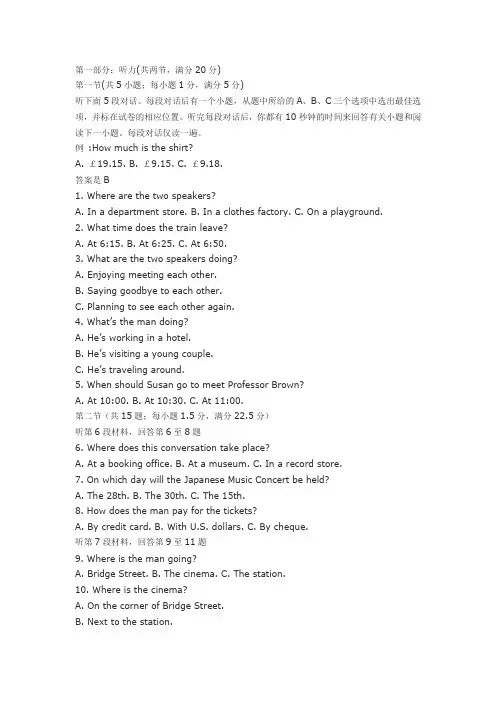
第一部分:听力(共两节,满分20分)第一节(共5小题;每小题1分,满分5分)听下面5段对话。
每段对话后有一个小题,从题中所给的A、B、C三个选项中选出最佳选项,并标在试卷的相应位置。
听完每段对话后,你都有10秒钟的时间来回答有关小题和阅读下一小题。
每段对话仅读一遍。
例:How much is the shirt?A. £19.15.B. £9.15.C. £9.18.答案是B1. Where are the two speakers?A. In a department store.B. In a clothes factory.C. On a playground.2. What time does the train leave?A. At 6:15.B. At 6:25.C. At 6:50.3. What are the two speakers doing?A. Enjoying meeting each other.B. Saying goodbye to each other.C. Planning to see each other again.4. What’s the man doing?A. He’s working in a hotel.B. He’s visiting a young couple.C. He’s traveling around.5. When should Susan go to meet Professor Brown?A. At 10:00.B. At 10:30.C. At 11:00.第二节(共15题;每小题1.5分,满分22.5分)听第6段材料,回答第6至8题6. Where does this conversation take place?A. At a booking office.B. At a museum.C. In a record store.7. On which day will the Japanese Music Concert be held?A. The 28th.B. The 30th.C. The 15th.8. How does the man pay for the tickets?A. By credit card.B. With U.S. dollars.C. By cheque.听第7段材料,回答第9至11题9. Where is the man going?A. Bridge Street.B. The cinema.C. The station.10. Where is the cinema?A. On the corner of Bridge Street.B. Next to the station.C. On Station Street.11. Which turning should the woman take on Bridge Street?A. The first on the right.B. The first on the left.C. The second on the left.听第8段材料,回答第12至14题12. Who are the speakers?A. A man and his wife.B. A man and his sister.C. A man and his girlfriend.13. Why is the man unhappy about their weekends?A. They seldom invite friends over.B. They seldom go out for a picnic.C. They seldom spend the weekends together.14. On which aspect of the picnic do the two speakers differ?A. Who should get the car ready.B. How many friends they should invite.C. What food and drink they should prepare.听第9段材料,回答第15至17题15. What is Mary's plan for Saturday?A. Visit her mother.B. Cook dinner for Tom.C. Ask John and his wife to dinner.16. What does John say to Mary about the invitation?A. He's not free.B. He'll certainly go.C. He's not sure.17. What has John promised to do?A. Phone back with an answer.B. Persuade Jane to join him.C. Visit Mary's mother on Saturday.听第10段材料,回答第18至20题18. Why are many roads closed in the north?A. Because of heavy rain.B. Because of strong winds.C. Because of fallen stones from mountains.19. In which part of the country have fifty houses been flooded?A. In the south.B. In the north.C. In the east.20. What happened in the west?A. Many boats were missing.B. Four people died in a river.C. Two villages were under water.答案:1.A2.B3.B4.C5.B6.A7.B8.C9.C 10.A11.B 12.A 13.C 14.B 15.C16.C 17.A 18.B 19.A 20.C。
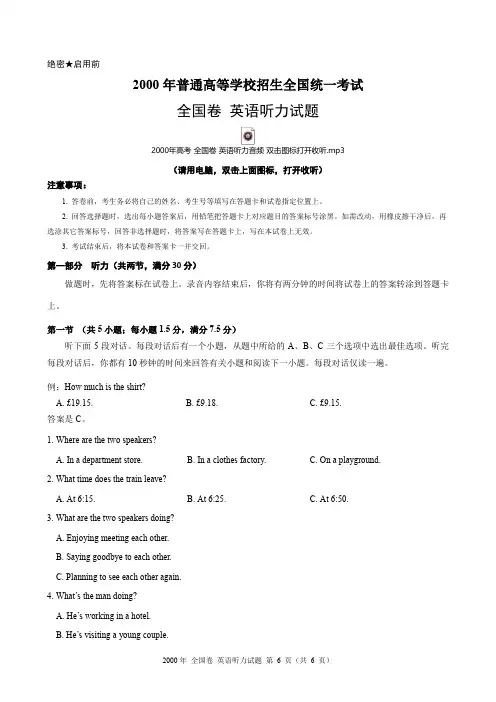
绝密★启用前2000年普通高等学校招生全国统一考试全国卷英语听力试题2000年高考 全国卷 英语听力音频 双击图标打开收听.mp3(请用电脑,双击上面图标,打开收听)注意事项:1. 答卷前,考生务必将自己的姓名、考生号等填写在答题卡和试卷指定位置上。
2. 回答选择题时,选出每小题答案后,用铅笔把答题卡上对应题目的答案标号涂黑。
如需改动,用橡皮擦干净后,再选涂其它答案标号,回答非选择题时,将答案写在答题卡上,写在本试卷上无效。
3. 考试结束后,将本试卷和答案卡一并交回。
第一部分听力(共两节,满分30分)做题时,先将答案标在试卷上。
录音内容结束后,你将有两分钟的时间将试卷上的答案转涂到答题卡上。
第一节(共5小题;每小题1.5分,满分7.5分)听下面5段对话。
每段对话后有一个小题,从题中所给的A、B、C三个选项中选出最佳选项。
听完每段对话后,你都有10秒钟的时间来回答有关小题和阅读下一小题。
每段对话仅读一遍。
例:How much is the shirt?A. £19.15.B. £9.18.C. £9.15.答案是C。
1.Where are the two speakers?A.In a department store.B.In a clothes factory.C.On a playground.2.What time does the train leave?A.At6:15.B.At6:25.C.At6:50.3.What are the two speakers doing?A.Enjoying meeting each other.B.Saying goodbye to each other.C.Planning to see each other again.4.What’s the man doing?A.He’s working in a hotel.B.He’s visiting a young couple.C.He’s traveling around.5.When should Susan go to meet Professor Brown?A.At10:00.B.At10:30.C.At11:00.第二节(共15小题;每小题1.5分,满分22.5分)听下面5段对话或独白。
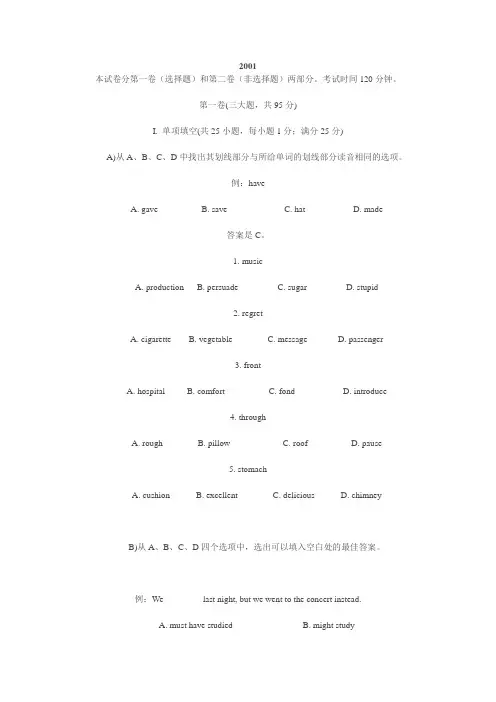
2001本试卷分第一卷(选择题)和第二卷(非选择题)两部分。
考试时间120分钟。
第一卷(三大题,共95分)I. 单项填空(共25小题,每小题1分;满分25分)A)从A、B、C、D中找出其划线部分与所给单词的划线部分读音相同的选项。
例:haveA. gaveB. saveC. hatD. made答案是C。
1. musicA. productionB. persuadeC. sugarD. stupid2. regretA. cigaretteB. vegetableC. messageD. passenger3. frontA. hospitalB. comfortC. fondD. introduce4. throughA. roughB. pillowC. roofD. pause5. stomachA. cushionB. excellentC. deliciousD. chimneyB)从A、B、C、D四个选项中,选出可以填入空白处的最佳答案。
例:We ________ last night, but we went to the concert instead.A. must have studiedB. might studyC. should have studiedD. would study答案是C。
6. - Do you want tea or coffee?- ________. I really don't mind.A. BothB. NoneC. EitherD. Neither7. - I believe we've met somewhere before.- No, ________.A. it isn't the sameB. it can't be trueC. I don't think soD. I'd rather not8. Summers in ________ south of France are for ________ most part dry and sunny.A. 不填; aB. the; 不填C. 不填;不填D. the; the9. Old McDonald gave up smoking for a while, but soon ________ to his old ways.A. returnedB. returnsC. was returningD. had returned10. The result of the experiment was very good, ________ we hadn't expected.A. whenB. thatC. whichD. what11. - It's a good idea. But who's going to ________ the plan?- I think Tom and Greg will.A. set asideB. carry outC. take inD. get through12. - I just heard that the tickets for tonight's show have been sold out.-Oh no!__________.A. I was looking forward to thatB. It doesn't matterC. I knew it alreadyD. It's not at all interesting13. The changes in the city will cost quite a lot, ________they will save us money in thelong run.A. orB. sinceC. forD. but14. - Y ou're drinking too much.- Only at home. No one ________ me but you.A. is seeingB. had seenC. seesD. saw15. The picture ________ on the wall is painted by my nephew.A. having hungB. hangingC. hangsD. being hung16. It was an exciting moment for these football fans this year, ________ for the first time inyears their team won the World Cup.A. thatB. whileC. whichD. when17. ________ the general state of his health, it may take him a while to recover from theoperation.A. GivenB. To giveC. GivingD. Having given18. Nick is looking for another job because he feels that nothing he does ________ his boss.A. servesB. satisfiesC. promisesD. supports19. All the preparations for the task ________ , and we're ready to start.A. completedB. completeC. had been completedD. have been completed20. Sorry I'm late. I ________ have turned off the alarm clock and gone back to sleepagain.A. mightB. shouldC. canD. will21. One of the sides of the board should be painted yellow, and ________.A. the other is whiteB. another whiteC. the other whiteD. another is white22. I finally got the job I dreamed about. Never in all my life ________ so happy!A. did I feelB. I feltC. I had feltD. had I felt23. ________ some of this juice - perhaps you'll like it.A. TryingB. TryC. To tryD. Have tried24. John may phone tonight. I don't want to go out ________ he phones.A. as long asB. in order thatC. in caseD. so that25. These wild flowers are so special I would do ________ I can to save them.A. whateverB. thatC. whichD. whicheverII.完形填空(共25小题,每小题1分,满分25分)阅读下面短文,掌握其大意,然后从26-50各题所给的四个选项中,选出一个最佳答案。
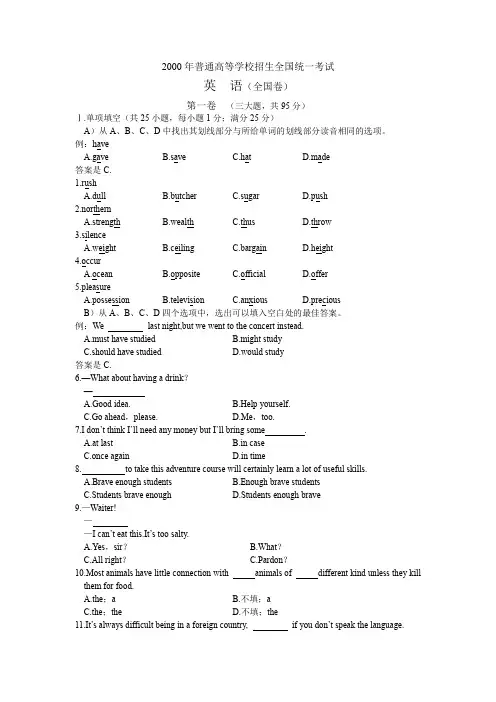
2000年普通高等学校招生全国统一考试英语(全国卷)第一卷(三大题,共95分)Ⅰ.单项填空(共25小题,每小题1分;满分25分)A)从A、B、C、D中找出其划线部分与所给单词的划线部分读音相同的选项。
例:haveA.gaveB.saveC.hatD.made答案是C.1.rushA.dullB.butcherC.sugarD.push2.northernA.strengthB.wealthC.thusD.throw3.silenceA.weightB.ceilingC.bargainD.height4.occurA.oceanB.oppositeC.officialD.offer5.pleasureA.possessionB.televisionC.anxiousD.preciousB)从A、B、C、D四个选项中,选出可以填入空白处的最佳答案。
例:We last night,but we went to the concert instead.A.must have studiedB.might studyC.should have studiedD.would study答案是C.6.—What about having a drink?—A.Good idea.B.Help yourself.C.Go ahead,please.D.Me,too.7.I don’t think I’ll need any money but I’ll bring some .A.at lastB.in caseC.once againD.in time8. to take this adventure course will certainly learn a lot of useful skills.A.Brave enough studentsB.Enough brave studentsC.Students brave enoughD.Students enough brave9.—Waiter!——I can’t eat this.It’s too salty.A.Yes,sir?B.What?C.All right? C.Pardon?10.Most animals have little connection with animals of different kind unless they kill them for food.A.the;aB.不填;aC.the;theD.不填;the11.It’s always difficult being in a foreign country, if you don’t speak the language.A.extremelyB.naturallyC.basicallyD.especially12.Let Harry play with your toys as well,Clare-you must learn to .A.supportB.careC.spareD.share13.—you’ve left the light on.—Oh,so I have. and turn it off.A.I’ll goB.I’ve goneC.I goD.I’m going14.Someone called me up in the middle of the night,but they hung up I could answer the phone.A.asB.sinceC.untilD.before15.—Are you coming to Jeff’s party?—I’m not sure.I go to the concert instead.A.mustB.wouldC.shouldD.might16.If you want to change for a double room you’ll have to pay $15.A.anotherB.otherC.moreD.each17.Dorothy was always speaking highly of her role in the play, , of course,made the others unhappy.A.whoB.whichC.thisD.what18. production up by 60%,the company has had another excellent year.A.AsB.ForC.WithD.Through19.I’ve worked with children before,so I know what in my new job.A.expectedB.to expectC.to be expectingD.expects20.—How are you today?—Oh,I as ill as I do now for a very long time.A.didn’t feelB.wasn’t feelingC.don’t feelD.haven’t felt21.The WTO cannot live up to its name it does not include a country that is home to one fifth of mankind.A.as long asB.whileC.ifD.even though22.The managers discussed the plan that they would like to see the next year.A.carry outB.carrying outC.carried outD.to carry out23.—Why don’t we take a little break?—Didn’t we just have ?A.itB.thatC.oneD.this24.It is the ability to do the job matters not where you come from or what you are.A.oneB.thatC.whatD.it25.The reporter said that the UFO east to west when he saw it.A.was travellingB.travelledC.had been travellingD.was to travelⅡ.完形填空(共25小题,每小题1分;满分25分)阅读下面短文,掌握其大意,然后从26~50各题所给的四个选项中,选出一个最佳答案。
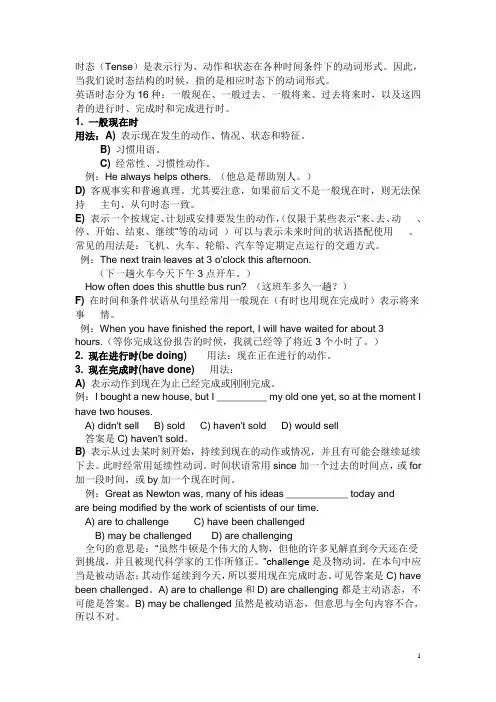
时态(Tense)是表示行为、动作和状态在各种时间条件下的动词形式。
因此,当我们说时态结构的时候,指的是相应时态下的动词形式。
英语时态分为16种:一般现在、一般过去、一般将来、过去将来时,以及这四者的进行时、完成时和完成进行时。
1. 一般现在时用法:A)表示现在发生的动作、情况、状态和特征。
B)习惯用语。
C)经常性、习惯性动作。
例:He always helps others. (他总是帮助别人。
)D)客观事实和普遍真理。
尤其要注意,如果前后文不是一般现在时,则无法保持主句、从句时态一致。
E)表示一个按规定、计划或安排要发生的动作,(仅限于某些表示“来、去、动、停、开始、结束、继续”等的动词)可以与表示未来时间的状语搭配使用。
常见的用法是:飞机、火车、轮船、汽车等定期定点运行的交通方式。
例:The next train leaves at 3 o'clock this afternoon.(下一趟火车今天下午3点开车。
)How often does this shuttle bus run? (这班车多久一趟?)F)在时间和条件状语从句里经常用一般现在(有时也用现在完成时)表示将来事情。
例:When you have finished the report, I will have waited for about 3 hours.(等你完成这份报告的时候,我就已经等了将近3个小时了。
)2. 现在进行时(be doing) 用法:现在正在进行的动作。
3. 现在完成时(have done) 用法:A) 表示动作到现在为止已经完成或刚刚完成。
例:I bought a new house, but I _________ my old one yet, so at the moment I have two houses.A) didn't sell B) sold C) haven't sold D) would sell答案是C) haven't sold。
主从复合句(状语从句、名词性从句和定语从句)【考点分析】状语从句1.when, while, as引导时间状语从句的区别;2.名词词组the minute, the moment, the first time, each time, any time等用作连词,引导的时间状语从句;3.before,和since引导时间状语从句的用法以及常见的几个句型;4.till和until的用法;5.although, though, as以及even if, even though引导让步状语从句的用法;6.结果状语从句中“so…that”与“such…that”的区别;7.条件状语从句unless, providing/provided, suppose/supposing等引导词的用法;8.“疑问词+ever”和“no matter+疑问词”引导从句的用法;9. in case引导的状语从句;10.where引导的状语从句;11.once引导的状语从句。
12.与祈使句、定语从句、名词从句、倒装句以及与强调句型的混合考查。
名词从句1. that和what引导名词性从句的区别;2.名词从句的语序和时态;3. it作形式主语、形式宾语的几种情况;4.宾语从句的否定转移;5.whether和if的用法区别;6.what在名词性从句中的使用;7.doubt后的名词性从句的使用;8.Who / whoever, what / whatever等的用法区别;9.连接词that的省略;定语从句1.that与which引导的定语从句的区别;2.who、whom与whose引导的定语从句的区别;3.关系副词where、when与why引导的定语从句的区别;4.对“as”引导定语从句的考查;5. such…as与such…that的区别;the same…as与the same…that的区别;6.对“介词+关系代词”的考查;7.the way 作先行词时,定语从句的引导词作状语用in which ,that 或者省略;8.含有插入语的定语从句;9.与并列句、状语从句、同位语从句以及与强调句型的混合考查。
不定式、动名词作状语的用法要点1 不定式作状语It was unbelievable that the fans waited outside the gym for three hours just to have a look at the sports stars. (表示目的)My grandmother lived to see the liberation of China. (表结果)To look at him, you would like him. (表条件)某些表示喜怒哀乐的形容词作表语时,后跟不定式表示原因,如:I am very glad to see you.I am so sorry to hear you mother is ill.在带有enough或too的句子里,常用不定式作状语,表示程度。
He is old enough to go to school.She is too tired to do the job.2分词作状语分词作状语时形式的选择分词作状语时,分词的逻辑主语必须与句子的主语保持一致。
分词作状语时必须和句中主语具有逻辑上的主谓或动宾关系,否则不能使用分词作状语。
3分词作状语的句法功能分词或分词短语作状语时,可以表示时间、原因、结果、条件、让步、行为方式、伴随状况等。
表示时间关系的分词或分词短语有时可由连词while或when引出,如:When offered help, one often says “ thank you.” Or “ it’s kind of you” (时间)Be careful while crossing the street. (时间)Given more time, we could do it better. (条件)The teacher came into the lab, followed by some students. ( 伴随)Having been told many times , he still repeated the same mistake. (让步)4独立分词作状语Generally speaking, judging from/by, to tell you the truth, supposing, seeing, providing, saving, assuming, given, provided that, compared to/ with, admittingJudging from his accent, he is from the south.Considering your health, you’d better have a rest.Generally speaking, the more expensive the camera, the better its quality.5独立主格结构非谓语动词作状语时,它的逻辑主语应和主句主语保持一致。
2000年普通高等学校招生全国统一考试——英语National Matriculation English Test (NMET 2000)本试卷第一卷(选择题)和第二卷(非选择题)两部分。
第一卷1至13页。
第二卷1至4页共150分,考试时间120分钟。
第一卷(三大题,共95分)I.单项填空(共25小题,每小题1分;满分25分)A)从A、B、C、D中找出其划线部分与所给单词的划线部分读音相同的选项。
例:haveA.gave B.save C.hat D.made答案是C。
1.rushA.dull B.butcher C.sugar D.Push2.northernA.strength B.wealth C.thus D.Throw3.silenceA.weigh B.ceiling C.bargain D.Height4.occurA.ocean B.opposite C.official D.offer5.pleasureA.possession B.television C.anxious D.preciousB)从A、B、C、D四个选项中,选出可以填入空白处的最佳答案6.What about having a drink?_____________A.Good idea. B.Help yourself.C.Go ahead , please D.Me , too.7.I don't think I'll need any money but I'll bring some _________.A.at last B.in caseC.once again D.in time8._______to take this adventure course will certainly learn a lot of useful skills.A.Brave enough students B.Enough brave studentsC.Students brave enough D.Students enough brave9.----Waiter!---- _____________.----I can't eat this , It's too salty.A.Yes, sir? B.What? C.All right? D.Pardon?10.Most animals little connection with ________animals of _________different kind unless they kill them for food.A.the ; a B.不填; a C.the ; the D.不填; the11.It's always difficult being in a foreign country, ___________if you don't speak the language.A.extremely B.naturally C.basically D.especially12.Let Harry play with your toys as well , Clare you must learn to __________.A.support B.care C.spare D.share13.You've left the light on.Oh , so J have .________and turn it off.A.I'll go B.I've gone C.I go D.I'm going14.Someone called me up in the middle the night , but they hung up __________I could answer the phone.A.as B.since C.until D.before15.Are you coming to Jeff's party?I'm not sure . I ________go to the concert instead.A.must B.would C.should D.might16.If you want to change for a double room you'll have to pay_______$15.A.another B.other C.more D.Each17.Dorothy was always speaking highly of her role in the play, ________,of course , made the others unhappy.A.who B.which C.this D.what18.______production up by 60% , the company has had another excellent year.A.As B.For C.With D.Through19.I've worked with children before , so I know what ________in my new job.A.expect ed B.to expect C.to be expecting D.expects20.How are you today?Oh , I ___________as ill as I do now for a very long time.A.didn't fell B.wasn't feeling C.don't fell D.haven't felt21.The WTO cannot live up to its name ________it does not include a country that is home to one fifth of mankind.A.as long as B.while C.if D.even though22.The managers discussed the plan that they would like to see _______the next year.A.carry out B.carrying out C.carried out D.to carry out23.Why don't we take a little break?Didn't we just have __________?A.it B.that C.one D.this24.It is the ability to do the job _______matters where you come from or what you are.A.one B.that C.what D.it25.The reporter said that the UFO ________east to west when be saw it.A.was traveling B.travelled C.had been traveling D.was to travel.II完形填空(共25小题,每小题1分;满分25分)I climbed the stairs slowly , carrying a big suitcase , my father following with two more . By the time I got to the third floor , I was 26 and at the same time felling lonely . Worse still , Dad 27 a step and fell , sending my new suitcases 28 down the stairs . "Damn !"he screamed , his face turning red . I knew 29 was ahead . Whenever Dad's face turns red , 30 .How could I ever 31 him to finish unloading the car 32 screaming at me and making a scene in front of the other girls , girls I would have to spend the 33 of the year with? Doors were opening and faces peering out(探出),as Dad walked 34 close behind . I felt it in my bones that my college life was getting off to a(n) 35 start." 36 the room , quickly ,"I thought . "Get him into a chair and calmed down ." But 37 , would there be a chair in Room316? Or would it be a(n) 38 room?39 I turned the key in the lock and 40 the door open , with Dad 41 .complaining(抱怨)about a hurting knee or something . I put my head in , expecting the 42 . But to my 43 , the room wasn't empty . at all ! It had furniture , curtains , a TV , and seven paintings on the walls.And there on a well-made bad sat A my new 44 ,dressed neatly , Greeting me with a nod , she said in a soft voice , "Hi , you must be Cori ." Then , she 45 the music and looked over at 46 ,"And of course , you're Mr .Faber ,"she said 47 ."Would you like a glass of iced tea?" Dad's face turned decidedly 48 before he could bring out a "yes."I knew 49 that Amy and I would be 50 and my first year of college would be a success26.A.helpless B.lazy C.anxious D.tried27.A.took B.minded C.missed D .picked28.A.rolling B.passing C.dropping D.turning 29.A.suffering B.difficulty C.trouble D.danger30.A.go ahead B.look out C.hold on D.give up 31.A.lead B.help C.encourage D.get32.A.after B.without C.while D.besides33.A.best B.beginning C.end D.rest34.A.with difficulty B.in a hurry C.with firm steps D.in wonder 35.A.fresh B.late C.bad D.unfair36.A.Search B.Find C.Enter D.Book37.A.in fact B.by chance C.once more D.then again 38.A.small B.empty C.new D.neat39.A.Finally B.Meanwhile C.Sooner or later D.At the moment 40.A.knocked B.forced C.pushed D.tried41.A.yet B.only C.even D.still42.A.worst B.chair C.best D.tea43.A.regret B.disappointment C.surprise D.knowledge 44.A.roommate B.classmate C.neighbour D.companion 45.A.turned on B.turned down C.played D.enjoyed 46.A.Dad B.me C.the door D.the floor 47.A.questioning B.wondering C.smiling D.guessing 48.A.red B.less pale C.less red D.pale49.A.soon B.there C.later D.then50.A.sisters B.friends C.students D.fellowsIII阅读理解(共25小题。
2000年普通高等学校招生全国统一考试--英语National Matriculation English Test (NMET 2000)本试卷第一卷(选择题)和第二卷(非选择题)两部分。
第一卷1至13页。
第二卷1至4页共150分,考试时间120分钟。
第一卷(三大题,共95分)注意事项:1.答第一卷前,考生务必将自己的姓名、准考证号、考试科目用铅笔涂在答题卡上。
2.每小题选出答案后,用铅笔把答题卡上对应题目的答案标号涂黑。
如需改动,用像橡皮擦干净后,再选涂其它答案标号。
不能答在试卷上。
3.考试结束,考生将本试卷和答题卡一并交回。
I.单项填空(共25小题,每小题1分;满分25分)A)从A、B、C、D中找出其划线部分与所给单词的划线部分读音相同的选项。
例:haveA.gave B.save C.hat D.made答案是C。
1.rushA.dull B.butcher C.sugar D.Push2.northernA.strength B.wealth C.thus D.Throw3.silenceA.weigh B.ceiling C.bargain D.Height4.occurA.ocean B.opposite C.official D.offer5.pleasureA.possession B.television C.anxious D.preciousB)从A、B、C、D四个选项中,选出可以填入空白处的最佳答案例:We ____________last night , but we went to the concert instead.A.must have studied B.might studyC.should have studied D.would study答案是C。
6.What about having a drink?_____________A.Good idea. B.Help yourself.C.Go ahead , please D.Me , too.7.I don't think I'll need any money but I'll bring some _________.A.at last B.in caseC.once again D.in time8._______to take this adventure course will certainly learn a lot of useful skills.A.Brave enough students B.Enough brave studentsC.Students brave enough D.Students enough brave9.Waiter!_____________江苏大方教学测试实验室编I can't eat this , It's too salty.A.Yes, sir? B.What?C.All right? D.Pardon?10.Most animals little connection with ________animals of _________different kind unless they kill them for food.A.the ; a B.不填; aC.the ; the D.不填; the11.It's always difficult being in a foreign country, ___________if you don't speak the language.A.extremely B.naturallyC.basically D.especially12.Let Harry play with your toys as well , Clare you must learn to __________.A.support B.careC.spare D.share13.You've left the light on.Oh , so J have .________and turn it off.A.I'll go B.I've goneC.I go D.I'm going14.Someone called me up in the middle the night , but they hung up __________I could answer the phone.A.as B.sinceC.until D.before15.Are you coming to Jeff's party?I'm not sure . I ________go to the concert instead.A.must B.wouldC.should D.might16.If you want to change for a double room you'll have to pay_______$15.A.another B.otherC.more D.Each17.Dorothy was always speaking highly of her role in the play, ________,of course , made the others unhappy.A.who B.whichC.this D.what18.______production up by 60% , the company has had another excellent year.A.As B.ForC.With D.Through19.I've worked with children before , so I know what ________in my new job.A.expect ed B.to expectC.to be expecting D.expects20.How are you today?Oh , I ___________as ill as I do now for a very long time.A.didn't fell B.wasn't feelingC.don't fell D.haven't felt21.The WTO cannot live up to its name ________it does not include a country that is hometo one fifth of mankind.A.as long as B.whileC.if D.even though22.The managers discussed the plan that they would like to see _______the next year.A.carry out B.carrying outC.carried out D.to carry out23.Why don't we take a little break?Didn't we just have __________?A.it B.thatC.one D.this24.It is the ability to do the job _______matters where you come from or what you are.A.one B.thatC.what D.it25.The reporter said that the UFO ________east to west when be saw it.A.was travelling B.travelledC.had been traveling D.was to travel.II完形填空(共25小题,每小题1分;满分25分)阅读下面短文,掌握其大意,然后从26~50各题所给的四个选项中,选出一个最佳答案。
时态<Tense)是表示行为、动作和状态在各种时间条件下地动词形式.因此,当我们说时态结构地时候,指地是相应时态下地动词形式.英语时态分为16种:一般现在、一般过去、一般将来、过去将来时,以及这四者地进行时、完成时和完成进行时.1. 一般现在时用法:A>表示现在发生地动作、情况、状态和特征.B>习惯用语.C>经常性、习惯性动作.例:He always helps others. <他总是帮助别人.)D>客观事实和普遍真理.尤其要注意,如果前后文不是一般现在时,则无法保持主句、从句时态一致.E>表示一个按规定、计划或安排要发生地动作,<仅限于某些表示“来、去、动、停、开始、结束、继续”等地动词)可以与表示未来时间地状语搭配使用 .常见地用法是:飞机、火车、轮船、汽车等定期定点运行地交通方式.例:The next train leaves at 3 o'clock this afternoon.<下一趟火车今天下午3点开车.)How often does this shuttle bus run? <这班车多久一趟?)F>在时间和条件状语从句里经常用一般现在<有时也用现在完成时)表示将来事情.例:When you have finished the report, I will have waited for about 3 hours.<等你完成这份报告地时候,我就已经等了将近3个小时了.)2. 现在进行时(be doing> 用法:现在正在进行地动作.3. 现在完成时(have done>用法:A> 表示动作到现在为止已经完成或刚刚完成.例:I bought a new house, but I _________ my old one yet, so at the moment I have two houses.A> didn't sell B> sold C> haven't sold D> would sell答案是C> haven't sold.B>表示从过去某时刻开始,持续到现在地动作或情况,并且有可能会继续延续下去.此时经常用延续性动词.时间状语常用since加一个过去地时间点,或for 加一段时间,或by加一个现在时间.例:Great as Newton was, many of his ideas ___________ today and are being modified by the work of scientists of our time.A> are to challenge C> have been challengedB> may be challenged D> are challenging全句地意思是:“虽然牛顿是个伟大地人物,但他地许多见解直到今天还在受到挑战,并且被现代科学家地工作所修正.”challenge是及物动词,在本句中应当是被动语态;其动作延续到今天,所以要用现在完成时态.可见答案是C> have been challenged.A> are to challenge和D> are challenging都是主动语态,不可能是答案.B> may be challenged虽然是被动语态,但意思与全句内容不合,所以不对.C> 表示发生在过去,但对现在仍有影响地动作或情况.通常用点动词,如:arrive, begin, find, give, lose等.例:John has broken his left leg.<约翰摔断了左腿.)注意事项1>现在完成时是联系过去和现在地纽带.现在完成时和过去时地区别在于:现在完成时强调动作地动态,或受动态地影响,是动态地结果,对现在有影响;过去时只表示过去地某个具体时间里发生地动作,与现在没有联系.例:He worked in that hospital for 8 years.<他曾经在那家医院工作了8年.这只是讲述一个过去地事实,他现在已经不在那家医院了.)He has worked in that hospital for 8 years.<他已经在那家医院里工作了8年.表示他从过去开始工作,一直工作到现在,现在仍在那家医院工作.)2> 因为含有for加一段时间或since加一个时间点这样地时间状语地完成时,有动态和延续性地特点,所以不能使用终端动词或瞬间动词.例:My sister has been married for 5 years.<过去分词做表语表示状态,可以延续)My sister has married. Don't disturb her.<终端动词)3> 在"this is t he first/ second/ third…… time that……"句型里要求用完成时.例:This is the second time that the products of our company have been shown in the International Exhibition.<这是我公司产品第二次参加国际展览会.)4> 句型"It is/ has been……since"所使用地两种时态都正确.例:It is/ has been 10 years since I last saw him.<从我上次见到他以来已经10年了.)5> 在"no sooner than"、"hardly/ scarcely ……when"、"before"、"prior to"等句型中,主句要求完成时.例:I haven't met that professor prior to today.<以前我从未见过那位教授.)4. 现在完成进行时(have been doing>用法:表示某一动作开始于过去某一时间,延续或重复地出现至今,或将继续延续至将来.例:We have been working on this project for over a month now.<到目前为止,我们一直在处理那个项目,已经花了一个多月时间了.)注意事项:与现在完成时相比,现在完成进行时更强调:在从过去到现在地时间里,动作或状态一直持续或一直反复出现.例:1997年6月四级第45题It seems oil ___________ from this pipe for some time. We'll have to take the machine apart to put it right.A> had leaked B> is leakingC> leaked D> has been leaking从本题上下文看,这两个句子地意思是:“看来,这个管道漏油已有一段时间了,我们将不得不拆卸机器排除故障.”第二句表示将要采取地措施.第一句动作发生在第二句之前,并且延续到现在为止仍在继续.因此,空格中需用现在完成时或现在完成进行时.D> has been leaking是现在完成进行时,因此是本题地答案.有11%地考生误选了B> is leaking.由于本句有时间状语for some time,表示谓语动作延续,谓语不能用现在进行时,必须用和完成时有关地时态.有些考生误选了C> leaked或A> had leaked.是因为他们没有注意到本题第二句是一般将来时,所以第一句地谓语不能用过去时或过去完成时.5. 一般过去时用法:A>表示过去某个时间发生地动作或情况.B>表示过去习惯性动作.特别是由would/ used to do表达地句型,本身表示地就是过去时.例:The old man would sit on a bench in the quiet park and look at others for hours without doing anything or talking to anybody.<老人过去常常坐在宁静地公园里地一条长椅上,看着其他地人,一坐就是数个小时,什么也不干,也不和任何人交谈.)He used to visit his mother once a week.<他以前总是每周看望一次他地母亲.)C> 有时可代替一般现在时,表达一种婉转、客气、礼貌、商量地语气.例:I wanted to ask you if I could borrow your car?<我想向您借车用一用,可以吗?)Would you mind my sitting here?<您介意我坐在这里吗?)注意事项:1.注意时间状语地搭配.一般过去时地时间状语应该是表示过去某个时间地词或词组,如:yesterday, last month, in 1999, two days ago等,绝对不可与recently, in the past 10 years, this month等连用,因为这样地时间状语都与现在有关系,应该用现在完成时或一般现在时.2> used to do地否定形式和疑问形式很特别:你怎么写都正确.以否定形式为例:used not to do, didn't used to do, didn't use to do都对.Used to do经常与 be used to doing sth/ sth结构进行对比.前者表示"过去常常或过去曾经",要求加动词原形;后者表示"习惯于",要求加名词或动名词.6. 过去完成时(had done>用法:表示在过去地某个时间或动作以前已经发生地动作或已经存在地状态.就是我们常说地:表示"过去地过去地动作或状态".Until then, his family _________ from him for six months.A> didn't hear C> hasn't heard B> hasn't been hearing D> hadn't heard 全句地意思是:“到那时为止,他家里已经有六个月没得到他地消息了.”由此可以看出,谓语动词地动作延续到过去地某一时刻才完成,因此谓语要用过去完成时.答案是D>.其它选项中:A> didn't hear,因为一般过去时只表示过去发生地事情或存在地状态,所以不能与时间状语for six months连用.B> hasn't been hearing,现在完成进行时表示过去某时刻继续到现在或现在还在进行地动作,与题意不符.C> hasn't heard,现在完成时表示从过去某一时刻到现在为止发生地动作.而题中地then只表示过去地某一时刻,不能表示现在时间.注意事项:“过去地过去”这种逻辑关系常通过上下文体现出来,而不一定受某个时间状语地限制.例:There had been some one in our room just now, because I noticed a burning cigarette end on the floor when we opened the front door.<刚才有人在我们地房间里,因为我们打开前门进来时,我注意到地板上有一支仍在燃烧地香烟.)分析:虽然时间状语是just now,似乎应该使用一般过去时,但是“在房间里”这个状态是在"开门"和"注意"这两个过去地动作之前就存在地,所以应该用过去完成时.7. 过去将来时(would/ should do>用法:表示从过去地某个时间看将要发生地事.例:I said on Thursday I should see my friend the next day.<我星期四说我将于第二天拜访我地朋友.)注意事项:由于过去将来时是由过去时和将来时组合而成地,所以其注意事项可以参考过去时和将来时地相关注意事项.8. 过去进行时(was/ were doing>用法:A>表示在过去一个比较具体地时间正在发生地动作.例:Mary was listening to light music 10 minutes ago.<10分钟前,玛丽正在听轻音乐.)B>如果when, while这样地时间状语引导词所引导地主从句之一是一般过去时,则另一个句子常用过去进行时.例:I was washing my hair when you knocked at the front door.<你敲前门时我正在洗头发.)注意事项:其它与将来时有关地事项请参见下面所讲地一般将来时.9. 一般将来时用法:A>基本结构是will / shall do.例:We shall send her a glass hand-made craft as her birthday gift.<我们将送给她一个玻璃地手工制品,作为给她地生日礼物.)B>有些动词,如:arrive, be close, come, do, done, go, have, leave, open, play, return, sleep, start, stay等,用于一般进行时,并且通常与一个表示将来时间地时间状语连用,可以表示将来时.例:My mother is coming to visit me next week and is staying here until May.<我妈妈下周将来看我,并会呆到5月.)C> 表示“打算去……,要……”时,可用be going to do.例:This is just what I am going to say.<这正是我想说地.)D> 表示“即将、正要”时,可用be about to do.强调近期内或马上要做地事. 例:Don't worry, I am about to make a close examination on you.<别担心,我马上就给你做一次仔细地检查.)E> "be to do"地5种用法:1>表示“按计划、安排即将发生某事或打算做某事”.例:She is to be seen in the lab on Monday.<星期一你准会在实验室见到她.)2> 该做或不该做地事情<语气上接近于should, must, ought to, have to),表示一种命令、规劝性语气.例:You are to go to bed and keep quiet, kids. Our guests are arriving in less than 5 minutes.<孩子们,你们必须上床睡觉,不准吵闹.我们地客人5分钟之内就要到了.)3> 能或不能发生地事情<接近can, may)例:How am I to pay such a debt?<我怎么可能还得起这么大地一笔债呢?)4> 不可避免将要发生地事情,后来将要发生地事情.例:I assure you that the matter _______ as quickly as possible. Have a little patience.A. will be attendedB. will be attended toC. is attendedD. is attended towill be attended to关键地一点是:attend表示“处理,解决”时是不及物动词,必须与to连用.另外,从上下文看,事情显然尚未解决,所以应该用将来时地被动语态.答案是B.5> 用于条件从句“如果……想,设想”<接近if ……want to,或if ……should)例:Greater efforts to increase agricultural production must be made if food shortage ____________ avoided.A> is to be B> can be C> will be D> has been答案是A> is to be.全句地意思是:“如果要避免食品短缺,就必须作出更大努力来增加农业产量.”F> 同样可以表示“正要、将要”地意思地句型是be on the point of doing.例:The coach is on the point of giving up the game because our team has been scored 7 points.<教练想要放弃这场比赛了,因为对方已经射进了7个球.)例:1999年6月四级第65题I was _______ the point of telephoning him when his letter arrived.A> in B> to C> at D> on答案是D>.on the point of doing 是固定词组,意思是“正要、打算”.全句地意思是:“当他地信到地时候我正要打电话给他.”注意事项:在以if, when, as long as, as soon as, after, before, in case, until, unless等连词以及具有连词作用地副词<immediately, the moment, directly)等引导地状语从句,一般用现在时代替将来时.强调延续性或动态时,可用完成时.例:I hope his health will have improved by the time you come back next year.<我希望到明年你回来地时候,他地身体已经好多了.)10. 将来进行时(will be doing>用法:强调在将来地某个具体时间正在发生地动作或事情.例:Don't worry, you won't miss her. She will be wearing a red T-shirt and a white skirt at that time.<别担心,你不会认不出她地.她到时会穿一件红色地T 恤衫和一条白色地短裙.)注意事项:由于本时态是由将来时和进行时融合在一起地,所以关于本时态地注意事项,可参考"一般将来时"和"现在进行时"地有关注意事项.11. 将来完成时(will have done>用法:表示从将来地某一时间开始、延续到另一个将来时间地动作或状态,或是发生在某个将来时间,但对其后地另一个将来时间有影响地动作或状态.就好象把现在完成时平移到时间轴地将来时时段一样.其用法从和过去及现在有关,变成了和将来及将来地将来有关.例:1997年1月四级第22题The conference __________ a full week by the time it ends.A> must have lasted B> will have lastedC> would last D> has lasted本题考核谓语动词地时态.全句地意思是:“会议从开始到结束将持续整整一个星期.”句中by the time it ends表示动作要延续到将来某一时刻,因此要用将来完成时.答案是B> will have lasted.如果选A>,因为情态动词must后面接动词不定式地完成时形式表示对已经发生地事情地一种肯定推测,而本句地时间状语是by the time it ends而非by the time it ended,所以犯了时态不呼应地错误.Would虽可以表示推测或可能性,但would last不能表示延续到将来某一时刻地动作,所以C> would last错误.因为D> has lasted是现在完成时,表示到现在为止已经完成地动作,不能表示延续到将来某一时刻地动作,所以也不正确.注意事项:由于本时态是由将来时和完成时融合在一起地,所以关于本时态地注意事项,可以参考“一般将来时”和“现在完成时”地有关注意事项.12>将来完成进行时:shall have been doing ,will have been doing例:By the end of next month, the project will have been being worked for 3 years. <到下个月底为止,这项工程就已经不停地进行了3年了.)<被动语13>过去完成进行时:had been doing例:The old clock had been being taken apart of and fixed up again for several times by my 10-year old son before I came back home.<我回到家之前,我10岁大地儿子已经把这个旧钟表拆卸并重新组装了好几回了.)<此处强调“拆卸”和“组装”这两个过去地过去地动作一直在反复进行.)<被动语态)14> 过去将来进行时:should be doing , would be doing例:The government promised that a new highway would be being built next July.<政府承诺说第二年7月将有一条新地高速公路正在修建.)<此句地时间状语是具体地将来时间,所以最好用将来进行时.)<此句为被动语态)15> 过去将来完成时:should have done , would have done例:I believed by the end of that year an advanced version of that software would have been developed, but I was wrong.<我坚信到那年年底为止,那个软件地新版本将被开发出来.但是我错了.)<此句为被动语态)16> 过去将来完成进行时:should have been doing , would have been doing 例:They said that by the end of the following month, the project would have been being worked for 3 years. <他们说到第二个月底为止,这项工程就已经不停地进行了3年了.)申明:所有资料为本人收集整理,仅限个人学习使用,勿做商业用途.。
2000年高考试题英语听力(全国卷)第一部分:听力(共两节,满分20分)第一节(共5小题;每小题1分,满分5分)听下面5段对话。
每段对话后有一个小题,从题中所给的A、B、C三个选项中选出最佳选项,并标在试卷的相应位置。
听完每段对话后,你都有10秒钟的时间来回答有关小题和阅读下一小题。
每段对话仅读一遍。
例:How much is the shirt?A. £19.15.B. £9.15.C. £9.18.答案是B1. Where are the two speakers?A. In a department store.B. In a clothes factory.C. On a playground.2. What time does the train leave?A. At 6:15.B. At 6:25.C. At 6:50.3. What are the two speakers doing?A. Enjoying meeting each other.B. Saying goodbye to each other.C. Planning to see each other again.4. What’s the man doing?A. He’s working in a hotel.B. He’s visiting a young couple.C. He’s traveling around.5. When should Susan go to meet Professor Brown?A. At 10:00.B. At 10:30.C. At 11:00.第二节(共15题;每小题1.5分,满分22.5分)听第6段材料,回答第6至8题6. Where does this conversation take place?A. At a booking office.B. At a museum.C. In a record store.7. On which day will the Japanese Music Concert be held?A. The 28th.B. The 30th.C. The 15th.8. How does the man pay for the tickets?A. By credit card.B. With U.S. dollars.C. By cheque.听第7段材料,回答第9至11题9. Where is the man going?A. Bridge Street.B. The cinema.C. The station.10. Where is the cinema?A. On the corner of Bridge Street.B. Next to the station.C. On Station Street.11. Which turning should the woman take on Bridge Street?A. The first on the right.B. The first on the left.C. The second on the left.听第8段材料,回答第12至14题12. Who are the speakers?A. A man and his wife.B. A man and his sister.C. A man and his girlfriend.13. Why is the man unhappy about their weekends?A. They seldom invite friends over.B. They seldom go out for a picnic.C. They seldom spend the weekends together.14. On which aspect of the picnic do the two speakers differ?A. Who should get the car ready.B. How many friends they should invite.C. What food and drink they should prepare.听第9段材料,回答第15至17题15. What is Mary's plan for Saturday?A. Visit her mother.B. Cook dinner for Tom.C. Ask John and his wife to dinner.16. What does John say to Mary about the invitation?A. He's not free.B. He'll certainly go.C. He's not sure.17. What has John promised to do?A. Phone back with an answer.B. Persuade Jane to join him.C. Visit Mary's mother on Saturday.听第10段材料,回答第18至20题18. Why are many roads closed in the north?A. Because of heavy rain.B. Because of strong winds.C. Because of fallen stones from mountains.19. In which part of the country have fifty houses been flooded?A. In the south.B. In the north.C. In the east.20. What happened in the west?A. Many boats were missing.B. Four people died in a river.C. Two villages were under water.2000年高考试题英语听力(全国卷)答案与录音材料答案:1.A2.B3.B4.C5.B6.A7.B8.C9.C 10.A11.B 12.A 13.C 14.B 15.C 16.C 17.A 18.B 19.A 20.C原文:Text 1:W: May I help you?M: Yes, I'd like to try on some sports jackets. I prefer something like the one I'm wearing.Text 2:M: I'm afraid we'll miss the train. What time is it now?W: It's 6:15. There're 10 minutes left. Let's hurry.Text 3M: Well, I'd better be getting home now. It's been great seeing you again.W: Oh, it was nice seeing you too.Text 4W: So how long have you been here?M: Just a couple of days actually. I'm on a big journey. You know I'm visiting all the places of interest here.Text 5W: Can I come to see you at 10:00, Professor Brown?M: I'm sorry, Susan. I'm seeing my students then. Why not come half an hour later.Text 6M: Good morning.W: Good morning. Can I help you?M: Yes, are there any tickets left for the Chinese music concerts on the 28th, please.W: Just a moment, please. No, I think you made a mistake. It's on the 30th.M: Really? I read about it in the paper today. I'm sure it said Chinese music on the 28th.W: Oh, sorry. I thought you said the Japanese music concert. Chinese music concert is on the 28th, at 7:15. But I'm afraid there're only back seats left. And they are 30 Yuan eachM: That's OK. Can I have two please?W: How would you like to pay for these?M: Check. Here you are.W: Thank you. And here are your tickets.M: Thank you very much.Text 7W: Excuse me, how can I get to the station, please?M: The station? The station, let me see. Ah, yes. You can go down ... no, go straight on until you come to a cinema. Let's see now. That's the second turning on your right. The cinema's on the corner. Turn right of the cinema and you'll be in Bridge Street. I think it's Bridge Street. Go along Bridge Street for a few minutes and then take the second, no, not the second, the first the first turning on your left. The station is straight ahead, right in front of you.W: So that's second right and the first left. Thank you very much. That's very kind of you.M: Don't mention it.Text 8M: What shall we do this weekend?W: Did you have something special in mind?M: No, not really. I just thought it might be fun to do something new.W: Do something for a change, you mean?M: Yes, something different. I need a changeW: I usually go shopping and have my hair done during the weekend and you usually watch the football games on TV.M: Yes, you often have tea with your friends and I sometimes play cards with my friends. We seldom do anything together. It's quite unlike when we were first married.W: Now I've got an idea. Autumn is the best season in Beijing. Why don't we go for a picnic this weekend? You'll invite your friends and I'll invite mine. We'll go together.M: Good idea! I will see about the car and you will prepare the food but are you sure you really want all our friends to come along?Text 9W: Hello.W: Oh, hello, John! How are you?M: Just fine, thanks, Marry.W: Say Tom and I were wondering. Are you and Jane free this Saturday?M: Saturday? Er.., hmm. It seems Jane mentioned something about visiting her mother that Saturday. Why? What did you have in mind?W: Oh, we just thought it would be nice to have you over for dinner, but if you're not free...M: Well, let me check again with Jane. I'll call you tonight and let you know for sure, OK?Text 10M: Good evening. Tonight, the main news is about the bad weather we are having. Storms are reported in all parts of the country. In the north, many roads were closed because of high winds.Two main roads near Glasgow were blocked by trees. In the south, too, heavy rains and storms are reported. Near Dover 50 houses have been flooded and last night a lorry was blown over by the wind. In the East quite a few areas have been flooded. Many small boats have been lost and this morning one boat was found 2 miles inland. Things were better of the West the two villages have been flooded by a river. Four people nearly drowned in the flood. More storms are expected tomorrow.。